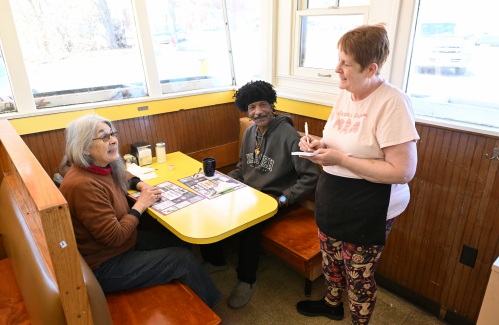Latest News

Wheeler Memorial Library’s Children’s Room reopens after flooding in Orange
ORANGE — The Wheeler Memorial Library’s Children’s Room has reopened to the public nearly 10 months after flooding caused by a contractor’s error and a rainstorm.

Buckland voters OK grant match for historic properties survey
BUCKLAND — After lengthy discussion, a tied vote and a recount, voters approved appropriating $12,500 for a Historical Commission grant match to update records of historical sites in town.
Most Read
 Conway barn destroyed in blaze likely caused by lightning strike
Conway barn destroyed in blaze likely caused by lightning strike
 Athol man to serve five to seven years on child abuse charges
Athol man to serve five to seven years on child abuse charges
 Northfield man dies in Erving motorcycle crash; Bernardston man injured in Deerfield crash
Northfield man dies in Erving motorcycle crash; Bernardston man injured in Deerfield crash
 Greenfield Planning Board votes against proposed ADU amendments
Greenfield Planning Board votes against proposed ADU amendments
 Rafters rescued from Deerfield River in Charlemont
Rafters rescued from Deerfield River in Charlemont
 Colrain voters to decide on $850K fire truck, meals tax
Colrain voters to decide on $850K fire truck, meals tax
Editors Picks
 Greenfield Police Logs: April 7 to April 13, 2025
Greenfield Police Logs: April 7 to April 13, 2025
 East-meets-West book ‘Kuni’ explores rural-urban connections
East-meets-West book ‘Kuni’ explores rural-urban connections
 PHOTOS: Election season heats up
PHOTOS: Election season heats up
 Two longtime public servants vying for Selectboard seat in Northfield
Two longtime public servants vying for Selectboard seat in Northfield
Sports

Bulletin Board: Four Rivers girls ultimate takes second at Amherst Invitational
The Amherst Invitational Ultimate Tournament took place over the weekend, with the Four Rivers girls taking second place overall after falling to Amherst in the championship game, 9-8.
 Bulletin Board: Pipione’s earns Newt Guilbault win
Bulletin Board: Pipione’s earns Newt Guilbault win
 HS Roundup: Frontier boys tennis takes down Greenfield, 4-1 (PHOTOS)
HS Roundup: Frontier boys tennis takes down Greenfield, 4-1 (PHOTOS)
Opinion

Guest columnist Jennifer Pederson: Do you know how often your water gets a check-up?
When was the last time you visited your doctor for a regular check-up? Maybe annually, perhaps even twice a year if you’re diligent. Now, consider this: your drinking water gets checked hundreds, even thousands, of times every single month.
 Wendy Sibbison: Antisemitism in the news
Wendy Sibbison: Antisemitism in the news
 Pam Roberts: Buddy Baseball starts May 10
Pam Roberts: Buddy Baseball starts May 10
 Kathe Geist: Crossing the line on relocation
Kathe Geist: Crossing the line on relocation
 Corky Miller and Mark Arnold: Time to draw the line on ADUs
Corky Miller and Mark Arnold: Time to draw the line on ADUs

Your Daily Puzzles

An approachable redesign to a classic. Explore our "hints."

A quick daily flip. Finally, someone cracked the code on digital jigsaw puzzles.

Chess but with chaos: Every day is a unique, wacky board.

Word search but as a strategy game. Clearing the board feels really good.

Align the letters in just the right way to spell a word. And then more words.
Business

$200K grant fuels expansion at Radial Dynamics in Greenfield
GREENFIELD — Radial Dynamics, a Greenfield hydraulic engineering company, will steer its way into the future with its new high-tech manufacturing equipment, including a robotic arm that was purchased with the help of a $200,000 grant.
 As Shady Glen Diner awaits buyer, current owner extends hours, shores up staffing
As Shady Glen Diner awaits buyer, current owner extends hours, shores up staffing
 Expanding child care options: Hilltown Children’s Center opens in Shelburne
Expanding child care options: Hilltown Children’s Center opens in Shelburne
Arts & Life

Conway Historical Society to explore ‘forgotten Founding Father’ Joseph Hawley
Names like John Adams, Thomas Jefferson and Benjamin Franklin all evoke the image of the United States’ Founding Fathers, but have you ever heard of Major Joseph Hawley?
 Fun Fest to showcase day of music in Turners Falls on May 10
Fun Fest to showcase day of music in Turners Falls on May 10
Obituaries
 Fredric Scott
Fredric Scott
Brooktondale, NY - Fredric Winthrop Scott Ithaca, NY Dr. Fredric Winthrop Scott, 89, passed away April 24, 2025, peacefully at his home in Brooktondale, NY. Born in Greenfield, MA, Fred was the son of Clifton and Mildred Scott an... remainder of obit for Fredric Scott
 Steven M. Chase
Steven M. Chase
Greenfield, MA - Steven M. Chase, 73, of Colrain Road passed away Monday April 28, 2025, at home. He was born in Haverhill NH on August 29, 1951, the son of Robert and Noreen (Stimson) Chase. Steve grew up in Woodsville NH attending loc... remainder of obit for Steven M. Chase
 Salvatore Francis Arnone
Salvatore Francis Arnone
Bernardston, MA - Salvatore "Sal/Santa" Francis Arnone, 85, of Bernardston, passed away surrounded by his loving family Tuesday, 04/29/2025 after a tough battle with cancer. He was born in Enfield, CT on January 3, 1940, the son of the ... remainder of obit for Salvatore Francis Arnone
 Michael R. Hyytinen
Michael R. Hyytinen
Lt. Michael R. Hyytinen Pima, AZ - On March 22, 2025, Lt. Michael R. Hyytinen, United States Navy, Retired, decided today was the day to walk the wind. Michael was born in Fitchburg, Massachusetts on December 3, 1942, to his parents Rei... remainder of obit for Michael R. Hyytinen

 Driver taken to Springfield hospital after 18-wheeler rollover in Shutesbury
Driver taken to Springfield hospital after 18-wheeler rollover in Shutesbury
 ‘I waited my whole life for this’: Immigrants share their stories of coming to America
‘I waited my whole life for this’: Immigrants share their stories of coming to America
 Removed Bridge of Flowers plants to have second act through annual plant sale
Removed Bridge of Flowers plants to have second act through annual plant sale
 Montague Town Meeting voters to consider 31 articles, including $12.75M operating budget
Montague Town Meeting voters to consider 31 articles, including $12.75M operating budget
 All 30 articles, including solar grant match and $2.8M school assessment, OK’d in Ashfield
All 30 articles, including solar grant match and $2.8M school assessment, OK’d in Ashfield
 My Turn: ADUs — The owner is gone, and so is granny
My Turn: ADUs — The owner is gone, and so is granny
 Regional school budget, gift of woodlot approved at Leverett’s Town Meeting
Regional school budget, gift of woodlot approved at Leverett’s Town Meeting
 From Global to Local: Natural world’s gift economy has lessons for all
From Global to Local: Natural world’s gift economy has lessons for all
 Keeping Score with Chip Ainsworth: Amherst’s Jack Arena put together a coaching career for the ages
Keeping Score with Chip Ainsworth: Amherst’s Jack Arena put together a coaching career for the ages HS Roundup: Olivia Machon drives in winning run in extras to propel Frontier softball past Greenfield, 6-5
HS Roundup: Olivia Machon drives in winning run in extras to propel Frontier softball past Greenfield, 6-5 Northfield’s Wild Geese Decluttering helps clients achieve comfort through organization
Northfield’s Wild Geese Decluttering helps clients achieve comfort through organization Cooking up an expansion: Cocina Lupita eyes second location in Turners Falls
Cooking up an expansion: Cocina Lupita eyes second location in Turners Falls Northfield’s Trinitarian Congregational Church marks 200th year, looks to continue its ‘living legacy’
Northfield’s Trinitarian Congregational Church marks 200th year, looks to continue its ‘living legacy’ Speaking of Nature: Climbing out on a limb: The Hartford fern is not your typical fern
Speaking of Nature: Climbing out on a limb: The Hartford fern is not your typical fern Lesbian bar opens in Greenfield: Last Ditch is the new space for the Valley’s queer community
Lesbian bar opens in Greenfield: Last Ditch is the new space for the Valley’s queer community
